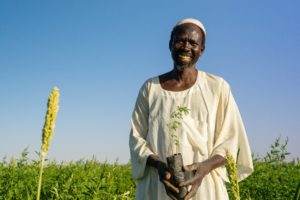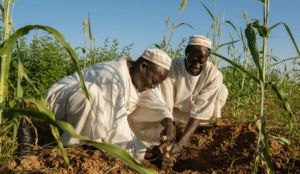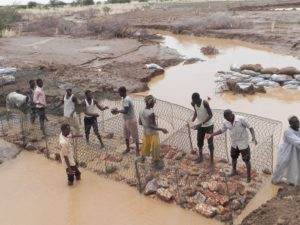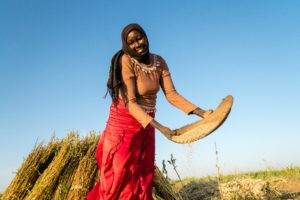We’re living in a new climate reality. Rains that used to fall no longer do. Crops that used to grow now fail. Extreme weather events are destroying millions of livelihoods, and their effects are felt most by the poorest and most vulnerable communities.
Here at Practical Action, our experience helping poor communities flourish in extreme environments puts us in the perfect position to address these problems. As the people at the sharp end of the climate crisis look for ways to adapt and thrive, we’re developing solutions that will help them turn the tables on climate change. Nowhere is this positive approach more needed than in the drought-prone farmlands of North Darfur, Sudan.
A human crisis in Sudan
“When I read about the climate crisis in the international press, it’s usually presented as something that’s going to cause people problems in the future. Here in Sudan, we don’t have the luxury of time – people are living with the negative impact of the climate crisis every single day. Recurrent droughts, failed crops, epidemics and endemic disease are part of life here. They come on top of the negative impact of conflict, which has caused massive poverty. In many places in Darfur, basic services such as clean water, electricity, education and healthcare are just a dream.”
Awadalla Hamid Mohamed, Practical Action project manager in Sudan
 Sudan has been described as the country most at risk from the effects of climate change on agriculture. The effects are already being felt by the country’s farmers. In North Darfur, where 80% of people live in rural areas and rely directly on local, natural resources for their livelihoods, the situation has reached tipping point.
Sudan has been described as the country most at risk from the effects of climate change on agriculture. The effects are already being felt by the country’s farmers. In North Darfur, where 80% of people live in rural areas and rely directly on local, natural resources for their livelihoods, the situation has reached tipping point.
Sudan is among the 12% least developed countries in the world. People living in North Darfur are the poorest – 69% of them live below the poverty line.
North Darfur is also one of the most drought prone areas of Sudan. Climate change has worsened the cycle of prolonged droughts and flash flooding – 20 out of the 25 driest years on record have occurred since 1972. The history of conflict in the area has exacerbated these problems – in recent years, an influx of people once displaced by conflict moving back to villages has meant more trees lost for firewood and more land turned to desert.
Small harvests bring big problems. They mean families have to pay higher prices for food and there’s more competition for land and water. Poorer quality soil has led to farmers cultivating bigger and bigger plots of land. This leads to new conflict with pastoralists, who find their traditional pasture lands under threat.
The hardships experienced by smallholder farmers in North Darfur are symptomatic of the devastating human impact of climate change. But it doesn’t have to be this way. Our previous success helping communities in the country means we already know that a solution exists to their problems.
25 years of positive action
In the quarter of a century that Practical Action has been working in Sudan, we’ve developed powerful solutions tailored to the unique challenges faced by its people. Our dedicated office in Khartoum is at the heart of our activities in the country and is staffed with local experts who have the expertise, the local knowledge and the network of contacts to work closely with communities and make a lasting impact.
We focus our work where it’s most needed, which includes the North Darfur area of rural El Fashir. People living here have been identified by the Humanitarian Needs Overview issued by the UN as amongst the most vulnerable to food insecurity. 22% of them have been classified as facing crisis and emergency.
In one project in El Fashir, which ran from 2013 to 2016, we helped communities build, maintain and operate water-harvesting dams. These dams meant that farmers could harvest crops several times a year, not just during the region’s one unpredictable rainy season. They also increased the area of land that could be farmed – boosting harvests even further – and provided a valuable source of extra water for household use.
The impact of this work on the lives of families in El Fashir was transformational, proving that practical solutions, local knowledge and a little ingenuity are a match for even the toughest challenges.
34 villages tripled their production of sorghum and millet
Farmers can grow new vegetables and cash crops until well into the dry season
4,500 farmers gained access to more land for cultivation
A community-run nursery grew 17,000 trees and 1,000 fruit seedlings
1,000 farmers and their families returned from displacement
 “In this project, the communities were well organised and trained in different aspects of development through farmers’ “field schools”. Training included agricultural techniques and business skills, which helped increase their crop production dramatically. The work that we and our partners have done in North Darfur has advanced the social and economic development of the region.”
“In this project, the communities were well organised and trained in different aspects of development through farmers’ “field schools”. Training included agricultural techniques and business skills, which helped increase their crop production dramatically. The work that we and our partners have done in North Darfur has advanced the social and economic development of the region.”
Awadalla Hamid Mohamed, Practical Action project manager in Sudan
The end result of this work? Market stalls overflowing with fresh, healthy produce, well fed families with enough money to buy necessities and communities living at peace with each other, free from competition over resources.
It’s been a victory for the planet as well as the people – reforestation has restored balance to the landscape, making the soil more fertile and strengthening the resilience of the land against flash flooding.
Our success was recognised on the world stage. In June 2017, Practical Action and our partners won the UN Convention to Combat Desertification’s Land for Life Award in recognition of the role of the project in reversing environmental degradation.
Together, we can turn the tables on climate change.
Donations will go directly to bringing lasting peace and prosperity to communities in North Darfur, and will enable the communities Practical Action work with around the world to turn the tables on climate change.
A deep dive into water management
Water is life. The farmers of North Darfur are reliant on water for their own survival, the survival of their families and their livelihoods. That’s why, when we’re working with communities in this drought-ravaged region, we start with water.
 You might be surprised to learn that there’s no shortage of rain in North Darfur. The problem is that all the rain falls at once – for three months of each year the land is subject to repeated deluges of rain that often result in flash floods that wash away fertile topsoil and precious seeds. The land is then parched for the next nine months – until the devastating rains return.
You might be surprised to learn that there’s no shortage of rain in North Darfur. The problem is that all the rain falls at once – for three months of each year the land is subject to repeated deluges of rain that often result in flash floods that wash away fertile topsoil and precious seeds. The land is then parched for the next nine months – until the devastating rains return.
Some might see this damaging seasonal cycle of drought and flood as an insurmountable challenge, but we’ve found ways to work with it and harness its power to provide year-round water for farmers.
We help communities construct dams and reservoirs to catch the precious water. We work with them to build an efficient network of pipes and wells that mean that the water can benefit as many farming families as possible. And we make sure that people know how to maintain and operate these systems themselves, so that they will continue to benefit communities for decades.
Water management is just the start – we’ve developed a series of supporting activities that help people fulfil the potential the year-round water opens up – and it benefits the environment as well as farming families.
“Planting forests to re-green land lost to the changing climate is one of the ways we use the saved water. These trees put vital nutrients back into the soil, making it more fertile. Their roots also improve the stability of the soil, which decreases the damage caused by floods during the rainy season. This work, along with the extra water available for irrigation, helps make farming more viable on more land that was previously barren.”
Awadalla Hamid Mohamed, Practical Action project manager in Sudan
Training is a vital part of any Practical Action project and our work in North Darfur is no exception. We work with farmers to improve their skills and knowledge in both agriculture and business more generally. Techniques such as crop rotation, crescent farming and crop spacing mean that farmers can maximise their harvests and their profitability.
These are some of the ways in which our work in North Darfur has already helped thousands of people take control of their lives and livelihoods, with greater confidence that their crops will survive and be more plentiful and valuable. Households are thriving and communities are at peace, rather than competing for land and water. Farming practices are more sustainable, protecting the environment for future generations.
An ongoing legacy
At this time of global climactic upheaval, our innovative approach, local knowledge and expertise are more vital than ever before. That’s why we’re planning an exciting and ambitious new project of work in North Darfur.
 We’ll use our tried-and-tested techniques to help 35,600 farmers in 19 villages over a three-year period thrive in the face of climate change.
We’ll use our tried-and-tested techniques to help 35,600 farmers in 19 villages over a three-year period thrive in the face of climate change.
Our combination of irrigation technology, farming training and peace-building will not only help farmers adapt to the effects of climate change, it will bring long-term peace and prosperity to people whose lives have already been turned upside down by conflict.
Our work in Sudan isn’t just about adapting to climate change. It’s about overcoming it, counteracting it and helping people thrive in the face of it. From water capture to irrigation, knowledge building to reforestation, we can work with communities to transform their world – using ingenious ideas to turn deserts into green, and disaster into hope.
And we won’t stop there. Your support can help create a world that works better for everyone, by enabling us to work with more people tackling some of the world’s toughest challenges, like the devastating effects of the climate crisis.
In short – we can turn the tables on climate change.